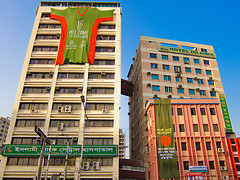
Sidney Award co-winner Steven Greenhouse continues his coverage of worker safety and labor rights in Bangladesh in the aftermath of the Rana Plaza factory collapse, the deadliest industrial catastrophe in history, which killed over 1000 workers. On Friday, the Obama administration laid out a set of conditions that Bangladesh will have to meet in order to get its special trade status restored:
Three weeks after announcing it would suspend Bangladesh’s trade preferences, the administration released an “action plan,” which calls on Bangladesh to significantly increase the number of labor, fire and building inspectors and to improve their training. The plan urges Bangladesh to impose stiffer penalties, including taking away export licenses, on garment factories that violate labor, fire or building safety standards.
In addition, the administration recommended that Bangladesh create a public database of all garment factories for reporting labor, fire and building inspections, including information on violations found, penalties assessed and violations corrected, with the names of the lead inspectors.
In addition to its demands for measurable progress on work safety, the administration drew attention to the widespread intimidation of Bangladeshi workers who seek to organize and bargain collectively and urged Bangladeshi leaders to safeguard the freedom of association of their workforce. Finally, the Obama administration called for a transparent investigation of the murder of union organizer Aminul Islam. Islam was an organizer with the Bangladesh Center for Worker Solidarity, he was murdered after helping Western journalists expose the terrible working conditions that have killed so many Bangladeshi garment workers in preventable fires. The Sidney Hillman Foundation presented its 2013 Officers’ Award for Public Service in Islam’s memory. We hope that mounting international pressure will help bring his killers to justice.
[Photo credit: Rushdi13, Creative Commons.]








